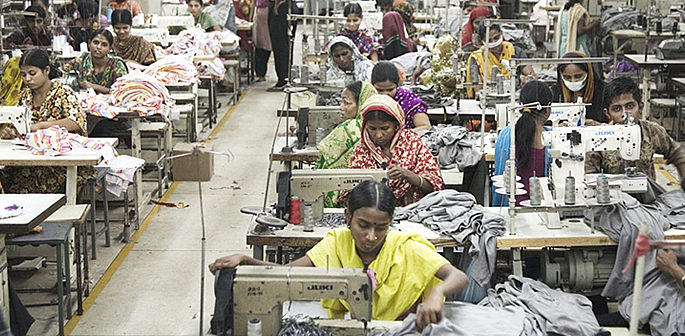"some of them don't have money for this rainy day"
Clothes makers in South Asia are being impacted by the Coronavirus pandemic in numerous ways but the main problem is the treatment by big clients.
Vijay Mahtaney is the chairman of Ambattur Fashion India.
Prior to the lockdowns, he and his partners Amit Mahtaney and Shawn Islam employ 18,000 workers in Bangladesh, India and Jordan.
However, the COVID-19 outbreak has forced them to shut down most of their business. One Dhaka-based factory remains partially operational.
This affects their ability to pay their workers.
Despite this, they say their main issue is unreasonable demands from big brands, mainly in the UK and US.
Amit, chief executive of Tusker Apparel Jordan, told the BBC:
“Some brands are showing a true sense of partnership and high level of ethics in trying to ensure at least enough cash flow to pay workers.
“But we’ve also experienced demands for cancellations for goods that are ready or are work in progress, or discounts for outstanding payments and for goods in transit.
“They are also asking for a 30 to 120-day extensions on previously agreed payment terms.”
It was revealed that one US retailer had requested a 30% discount “for all payables – current or order”, including those already delivered.
They cited that it was to “get through this extraordinary period”.
Vijay stated: “Their attitude is one of protecting only shareholder value without any regard to the garment worker, behaving in a hypocritical manner, showing complete disregard to their ethos of responsible sourcing.
“Brand focus on share price, now means some of them don’t have money for this rainy day and are coming to the weakest link in the supply chain, asking us to help them out when they could be applying for a bailout from the US government stimulus package.”

This comes as clothes makers have been hit by two lockdown-related issues.
They first started in February 2020 when factories could not get the required raw materials from China.
The second issue arose just as China’s textile factories reopened. Demand collapsed as retailers were forced to temporarily close after lockdowns were imposed.
China is known as the factory of the world but South Asian countries like Bangladesh play a prominent role when it comes to clothes.
Stanley Szeto, of apparel maker Lever Style, said:
“Garment manufacturing has been diversifying away from China for around ten years due to China’s high costs.”
This means that for many developing South Asian countries, garment manufacturing is a major industry.
The World Trade Organisation data shows that Bangladesh is one of the world’s largest clothing exporters. The country accounts for 6.7% of market share.
Bangladesh has over four million garment workers. In 2019, textile and apparel products made up more than 90% of the country’s exports.
The industry accounts for more than half of all manufacturing jobs in Bangladesh, with many women being employed.
Associate Professor Sheng Lu, of the University of Delaware’s department of fashion and apparel studies, thinks that the pandemic could see the likes of Bangladesh and India cutting between 4% and 9% of garment sector jobs.
This is a partial reason why the Bangladesh government is trying to help the industry.
Shawn Islam, managing director of Sparrow Apparel Bangladesh, said:
“It has offered a generous stimulus package to subsidise wages, convert loans to long-term debt and offer very reasonable interest rates.
“While it’s not enough to weather the storm, it will help.”
Following increased criticism, major brands like H&M and Zara-owner Inditex have promised to pay in full for existing orders from clothing manufacturers.
Dominique Muller, of Labour Behind the Label, said:
“Brands have profited for many years from producing in low wage countries without social security systems and have in many cases built up huge empires through this business model.
“Decades of exploitation must now be paid back to care for their workers.”
Amit agrees with the decision for bigger brands to help out clothing manufacturers.
“Retailers have to help out. Richer governments’ bailouts of the industry are also critical.”
He claimed that without their help, the industry could be wiped out completely.






























































